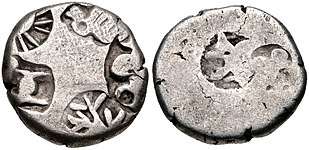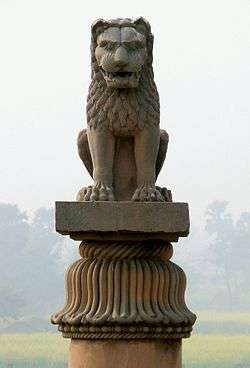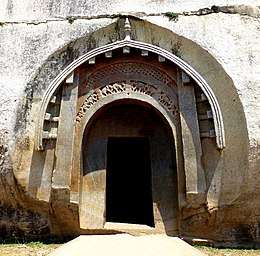Shalishuka
Shalishuka (IAST: Śāliśuka) Maurya was a ruler of the Indian Maurya dynasty.[2] He ruled from 215–202 BCE. He was the successor of Sunil Maurya. While the Yuga Purana section of the Gargi Samhita mentions him as a quarrelsome, unrighteous ruler, he is also noted as being of "righteous words" but "unrighteous conduct" due to his patronage of Jainism.[3]
- In that beautiful Puṣpapura, occupied by fewer than a hundred kings, there will be Śāliśūka, born for the destruction of the truth, the offspring of karma (Fate).
- That king, the offspring of karma, cheerful-minded [yet] fond of conflict, [will be] an oppressor of his own kingdom, of righteous speech but unrighteous conduct;
— Yuga Purana[4]
| Shalishuka Maurya | |||||
|---|---|---|---|---|---|
 | |||||
| 6th Mauryan emperor | |||||
| Reign | c. 215 – c. 202 BCE | ||||
| Predecessor | Samprati | ||||
| Successor | Devavarman | ||||
| |||||
| Dynasty | Maurya | ||||
| Religion | Jainism | ||||
| Maurya Empire (322–180 BCE) | ||||||||||||||||||||
|---|---|---|---|---|---|---|---|---|---|---|---|---|---|---|---|---|---|---|---|---|
|
||||||||||||||||||||
According to the Puranas he was succeeded by Devavarman.[5]
Shalishuka Maurya Dynasty | ||
| Preceded by Samprati |
Maurya Emperor 215–202 BCE |
Succeeded by Devavarman |
Notes
- CNG Coins
- Sircar, D. C. (April 1963). "The Account of the Yavanas in the Yuga-Purāṇa". Journal of the Royal Asiatic Society of Great Britain & Ireland. 95 (1–2): 7. doi:10.1017/S0035869X00121379. JSTOR 25202591.
- Raychaudhuri, H.C. (1972) Political History of Ancient India, Calcutta: University of Calcutta, pp.312-3n.
- The Yuga Purana. Translated by Mitchiner, John E. Calcutta: The Asiatic Society. 1986. p. 91.
- Thapar, Romila (2001). Aśoka and the Decline of the Mauryas, New Delhi: Oxford University Press, ISBN 0-19-564445-X, p.183
This article is issued from Wikipedia. The text is licensed under Creative Commons - Attribution - Sharealike. Additional terms may apply for the media files.

